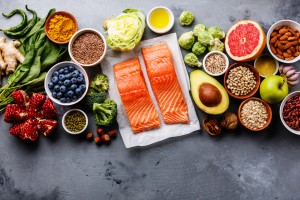Can Your Diet Reduce Inflammation?
Inflammation is a response from the body’s immune system to fight off infection. This is one way the body protects itself. Chemicals from the white blood cells are released into the blood or tissues. The blood flow to the infected or injured area is increased to promote healing. Inflammation can be acute, or short-lived, and chronic, meaning long lasting. Unfortunately, people can have excess inflammation in their body without even realizing it. Certain autoimmune disorders like rheumatoid arthritis and lupus can lead to chronic inflammation. Other medical conditions that are linked to chronic inflammation include cancer, diabetes, heart disease, lung disease, and kidney disease.
Symptoms of inflammation
 Common symptoms of inflammation include redness, swelling, warmth, and joint pain. Other notable symptoms include muscle stiffness, fever, chills, fatigue, and headaches. Chronic inflammation in the body can cause damage to the joints, the digestive tract, the heart, kidneys, and other organs.
Common symptoms of inflammation include redness, swelling, warmth, and joint pain. Other notable symptoms include muscle stiffness, fever, chills, fatigue, and headaches. Chronic inflammation in the body can cause damage to the joints, the digestive tract, the heart, kidneys, and other organs.
Medical treatments
A number of over-the-counter drugs can treat inflammation. Common medications that treat inflammation include aspirin, ibuprofen, and naproxen. These are known as NASAIDs, or nonsteroidal anti-inflammatory drugs. There are prescription drugs that also treat inflammation. A physician can prescribe the appropriate ones, based on what type of underlying condition is being treated.
Anti-inflammatory diet
 Lifestyle changes can be effective in reducing inflammation. Doctors may advise their patients to modify their diets to include foods that are known to be anti-inflammatory. An anti-inflammatory diet would eliminate many processed foods and include more fresh fruits and vegetables. Green leafy vegetables such as spinach, kale, and collards would be included in an anti-inflammatory diet. Tomatoes, strawberries, blueberries, apples, oranges, and cherries are healthy additions. Many of these foods are high in antioxidants and polyphenols, which help reduce inflammation. Beverages like coffee and tea, especially green tea, are also rich in polyphenols. Healthy oils, like olive oil, and fish that are high in omega-3 fatty acids including salmon, tuna, and sardines may help manage inflammation. Whole grain breads and pasta, almonds, walnuts, and spices like ginger and turmeric also aid in fighting inflammation.
Lifestyle changes can be effective in reducing inflammation. Doctors may advise their patients to modify their diets to include foods that are known to be anti-inflammatory. An anti-inflammatory diet would eliminate many processed foods and include more fresh fruits and vegetables. Green leafy vegetables such as spinach, kale, and collards would be included in an anti-inflammatory diet. Tomatoes, strawberries, blueberries, apples, oranges, and cherries are healthy additions. Many of these foods are high in antioxidants and polyphenols, which help reduce inflammation. Beverages like coffee and tea, especially green tea, are also rich in polyphenols. Healthy oils, like olive oil, and fish that are high in omega-3 fatty acids including salmon, tuna, and sardines may help manage inflammation. Whole grain breads and pasta, almonds, walnuts, and spices like ginger and turmeric also aid in fighting inflammation.
Foods to avoid
The following foods should be eliminated as much as possible from the diet, as they may actually increase inflammation. These include white bread and rice, red meat, processed meats, saturated fats, refined carbohydrates, processed snack foods, foods high in sugar, and foods containing trans fats including processed baked goods and fried foods. Cooking oils and margarines that are high in omega-6 fatty acids, including corn oil, safflower oil, and sunflower oil should also be eliminated. It’s important to read food labels. Excess alcohol is discouraged, and sugary beverages like sodas should be replaced with water.
If you would like to learn more about how an anti-inflammatory diet may be beneficial to you, contact your healthcare provider today.





